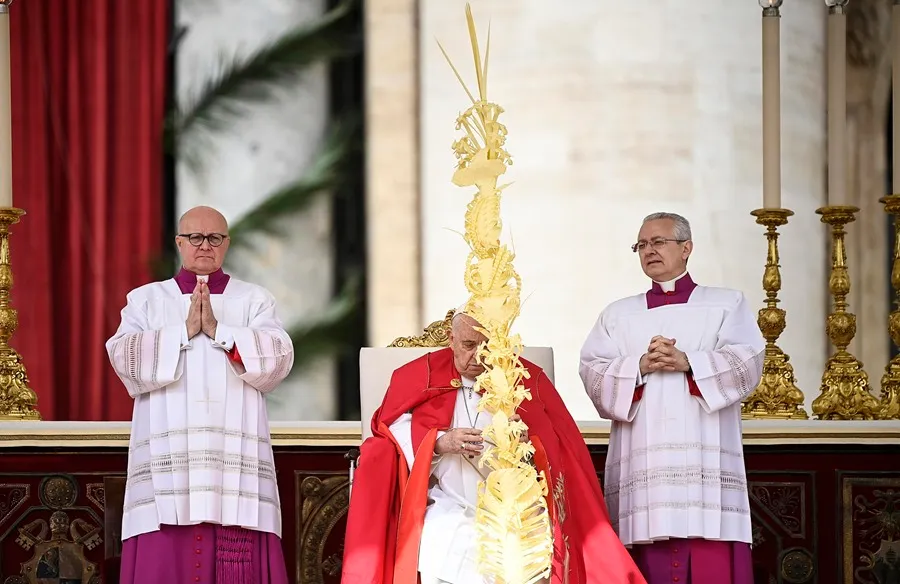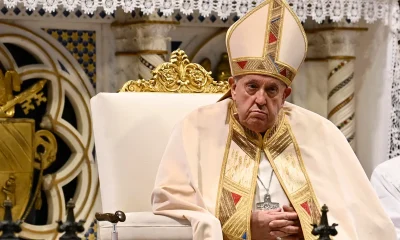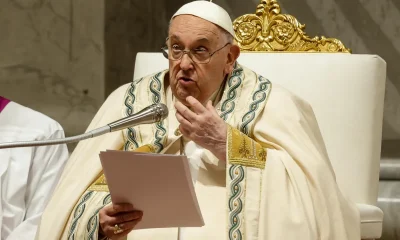International
Pope Francis does not read the homily at Palm Sunday Mass

Pope Francis did not read today the homily he had prepared for the Palm Sunday Mass, the Eucharistic celebration that opens the rites of Holy Week and that had gathered more than 60,000 faithful who crowded St. Peter’s Square in the Vatican.
At the opening of the ceremony, the 87-year-old pontiff had shown a tired voice and at the end of the reading of the Gospel, when the homily was expected, a prolonged silence followed after which he passed directly to the Creed.
The decision of the pope, who preferred not to read the homily to leave a time of personal reflection, was totally unexpected, since it was not planned for him to do so in such a prominent ceremony as Palm Sunday and surprised everyone by not doing so.
More than three weeks ago, Pope Francis had the flu and since then, although he has continued with his agenda, he has not been able to read on many occasions since he gets tired of reading long speeches.
Last Wednesday, during the general hearing, Francisco did not read the prepared catechesis and instead a collaborator did it because, he said: “I still can’t,” in reference to the respiratory problems he carries.
On this occasion no collaborator read the text and the Vatican did not give any immediate explanation about the cause for which Francis skipped the homily, something very unusual in a ceremony as important as Palm Sunday.
After the Mass, Francis did carry out the weekly Sunday prayer of the Angelus and his subsequent calls and messages
The square was decorated with the branches of olive trees and palms that the faithful, religious and members of the Curia had carried in procession before the mass, remembering the triumphal entry into Jerusalem of Jesus of Nazareth.
Before the mass, the procession took place in the central obelisk of St. Peter’s Square, where the branches were blessed.
Then they moved to the interior of the basilica in one of the oldest rites of Catholicism, which dates from the third century and in which today 30 cardinals, 25 bishops and 350 priests participated.
Pope Francis today condemned the “vile terrorist attack” last Friday in Moscow, which caused at least 133 deaths and which he described as “an inhuman act that offends God” during the Angelus prayer after the Palm Sunday Mass.
“I assure you of my prayers for the victims of the vile terrorist attack perpetrated the other night in Moscow. May the Lord receive them in his peace and comfort their families,” the pontiff said to the more than 25,000 faithful gathered in St. Peter’s Square.
Francis also showed his hope that he will “convert the hearts of those who protect, who organize and perform these inhuman acts that offend God, who ordered ‘You shall not kill’.”
Central America
Senator Van Hollen Meets with Deported MS-13 Member in El Salvador; Trump and Bukele React

U.S. Democratic Senator Chris Van Hollen, representing the state of Maryland, held a meeting in El Salvador with deported MS-13 gang member Kilmar Ábrego García, a member of the criminal group classified by the U.S. government as a terrorist organization.
“Kilmar Ábrego García, miraculously resurrected from the ‘extermination camps’ and ‘torture chambers,’ now sipping margaritas with Senator Van Hollen in the tropical paradise of El Salvador!” wrote President Nayib Bukeleon X (formerly Twitter), sharing photos of Van Hollen, Ábrego García, and a lawyer sitting together at a Salvadoran hotel.
The deported gang member is seen wearing a plaid shirt and a flat-brimmed cap, seated at a table with glasses and coffee cups. The senator also shared images of the meeting on his own social media accounts.
Bukele reaffirmed that Ábrego will remain in El Salvador and will not be returned to the United States.
“Now that his health has been confirmed, he has earned the honor of remaining under the custody of El Salvador,” Bukele added.
Former U.S. President Donald Trump criticized the senator’s meeting with Ábrego on Truth Social, calling Van Hollen “a fool” for advocating for Ábrego’s return to the U.S.
International
Pope Francis Appears for Easter Blessing, Calls for Peace and Religious Freedom

Pope Francis, still recovering from pneumonia, appeared on the balcony of St. Peter’s Basilica in the Vatican on Easter Sunday and, with a faint voice, wished a “Happy Easter” to the thousands of faithful gathered to celebrate the Resurrection of Christ.
A month after being discharged from a lengthy hospital stay, the presence of the 88-year-old pontiff had remained uncertain, with the Vatican not confirming his attendance ahead of time.
Eventually, the pope made a brief appearance in a wheelchair shortly after 12:00 p.m. (10:00 GMT) to deliver his traditional “Urbi et Orbi” blessing (“to the city and to the world”).
Although no longer wearing an oxygen cannula, the Argentine Jesuit relied on a close aide to read his Easter message, which touched on major global conflicts.
Francis condemned the “dramatic and unworthy humanitarian crisis” in Gaza and called for a ceasefire, while also expressing concern over the “growing climate of antisemitism spreading across the globe.”
He further emphasized the importance of religious freedom and freedom of thought, stating that without mutual respect, “peace is not possible.”
International
Thousands rally nationwide against Trump’s threat to U.S. democracy

Thousands of protesters gathered on Saturday (April 19, 2025) in major cities like New York and Washington, as well as in small communities across the United States, in a second wave of demonstrations against President Donald Trump. The crowds denounced what they view as growing threats to the country’s democratic ideals.
In New York City, demonstrators of all ages rallied in front of the Public Library near Trump Tower, holding signs accusing the president of undermining democratic institutions and judicial independence.
Many protesters also criticized Trump’s hardline immigration policies, including mass deportations and raids targeting undocumented migrants.
“Democracy is in grave danger,” said Kathy Valyi, 73, the daughter of Holocaust survivors. She told AFP that the stories her parents shared about Adolf Hitler’s rise to power in 1930s Germany “are happening here now.”
In Washington, demonstrators voiced concern over what they see as Trump’s disregard for long-standing constitutional norms, such as the right to due process.
-

 International5 days ago
International5 days agoArsenal stun Real Madrid at the Bernabéu to reach Champions League semifinals
-

 Central America4 days ago
Central America4 days agoNicaraguan Exiles to Mark 7th Anniversary of 2018 Protests with Global Commemorations
-

 International4 days ago
International4 days agoDominican ‘False Hero’ Arrested for Faking Role in Nightclub Collapse That Killed 231
-

 International3 days ago
International3 days agoACLU seeks emergency court order to stop venezuelan deportations under Wartime Law
-

 International5 days ago
International5 days agoBogotá residents line up for yellow fever vaccine amid national alert
-

 Central America3 days ago
Central America3 days agoUN complaint filed against Costa Rica over detention of migrant children
-

 International5 days ago
International5 days agoDeSantis’ immigration crackdown sparks alarm in Venezuelan Communities in Doral
-

 International5 days ago
International5 days agoMexico refuses to restore ties with Ecuador while Noboa remains in office
-

 International1 day ago
International1 day agoThousands rally nationwide against Trump’s threat to U.S. democracy
-

 Central America18 hours ago
Central America18 hours agoSenator Van Hollen Meets with Deported MS-13 Member in El Salvador; Trump and Bukele React
-

 International18 hours ago
International18 hours agoPope Francis Appears for Easter Blessing, Calls for Peace and Religious Freedom



















